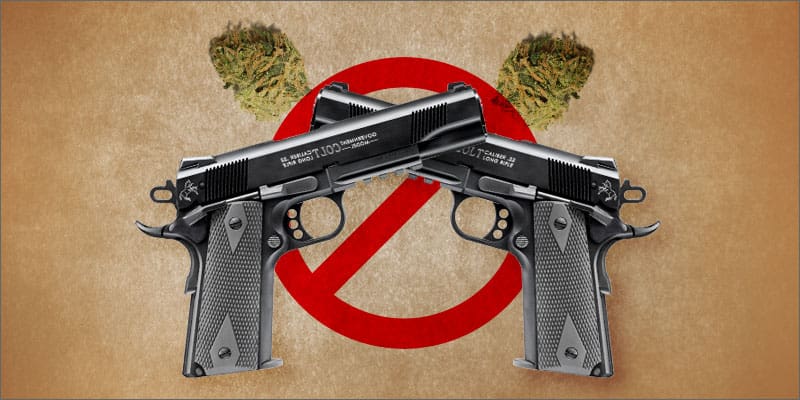Thanks to the agenda-driven news media, almost every television and digital outlet in America was fed the story of a negligent discharge that shut down a gun show in Raleigh, North Carolina last weekend. According to numerous reports, a shotgun was discharged when the owner was presenting it for inspection at the entry point to the show. Three persons were injured, none died. Anyone who has ever attended a gun show understands the drill. Private sale guns are brought up to the table for inspection by a police officer or security guard. They run a zip-tie through the chamber or action somehow to keep the gun from operating or being loaded. In the case described above, the shotgun never got to that point and went ‘bang’ before it could be zip-tied. The news agencies, naturally, reported this as an “accidental shooting”. While it might be a simple and generic description, it was not an “accident” . . .
Many moons ago while attending the Ohio Peace Officer’s Academy, I studied State and Constitutional law. Every suspect act has a corresponding culpable mental state, to include purposeful, knowledgeable, reckless, and negligent. A negligent mental state is one in which a person fails to “exercise due care” or “fails to protect another person…from unreasonable risk of harm.”
Having been a professional firearms instructor since 1990 when I became a Rifle/Pistol Marksmanship Coach in the USMC, I’ve taught the Four Universal Safety Rules that were best enumerated by Col. Jeff Cooper so many decades ago. Treat every gun as if it’s loaded, never allow the muzzle to cross anything you are not willing to destroy, keep your finger off the trigger until you’ve made the decision to shoot and know your target and what’s beyond it. Yes, these have been worded a bit differently, but the purpose remains the same. If you follow all four rules the chances of a person being injured inadvertently are miniscule.
Conversely, any time a person is injured or killed unintentionally by gunfire, you can go back and consider the Four Universal Rules and find at least one — and most often two — that was violated. As bona fide good guys, we cannot simply say “oops, my bad” when a round from a gun strikes someone or something it should not have. We have to hold ourselves to a higher standard.
When it comes to handling firearms, ‘accidental’ and ‘negligent’ are not interchangeable terms. My good friend John Farnam has been preaching that fact for thirty years or more. An accident is something that could have been prevented by any reasonable means. For instance, a worn, cracked, or weak sear, lever, or component in a firearm breaks and the gun discharges without warning. Though extremely rare, it does happen. Slam-fires, where the gun discharges just because the action closes are again rare, but they do happen.
A negligent discharge, though, occurs because the person holding the gun did something they shouldn’t have. Ninety-nine times out of a hundred that act is putting their finger reflexively onto the trigger when it has no business being there. In order for a person to be injured, the muzzle needs to be pointed in their general vicinity. That’s two or three broken rules, depending on how you look at it.
The eyes of the entire world are fixed on every law-abiding gun owner in America right now. The other side squeals with delight any time they perceive a mistake has been made. Negligent discharges in public places are exactly the kind of fodder they’re looking for to back up their argument: “see people shouldn’t be allowed to own guns, they’re too dangerous.”
Yes, firearms are dangerous implements. If they weren’t they’d be useless. Chainsaws and welding torches are dangerous too, but we still use them. As lawful, responsible good guys we need to police our own.
If you see someone handling a gun in an unsafe manner, say something. You don’t need to be a jerk, but a quick “hey buddy, would you mind pointing that somewhere else” or “did you know your finger was on the trigger?” might be appropriate. If you slip up and violate one of the rules, be a man (or a woman) about it and correct yourself without getting butthurt.
Folks, it’s as simple as this: if we don’t police ourselves when it comes to simple matters like basic firearms safety, there are those out there who are just aching for the chance to do it for us. It’s already happening on a small scale. When it happens on a nationwide basis, you won’t like it.
All of the previously discussed material and much more about safe and effective gun handling are addressed in the new DVD “Armed Living: Concealed Carry in an Uncertain World”. The DVD is available right now at www.studentofthegungear.com
About the Author
Paul Markel has been a firearms industry writer for twenty years and is the author of the new book “Student of the Gun; A beginner once, a student for life.” Paul hosts and produces “Student of the Gun” a show dedicated to education, experience, and enjoyment of firearms. Episodes of SOTG can be viewed by simply going to www.studentofthegun.com and clicking the “play” icon.






Why was he selling a loaded shotgun?
Package deal?
He probably put it in the closet loaded years before and forgot. After my father died we were cleaning out the closet and found a .22 with one in the chamber. It had probably been there for 5+ years. When I picked it up to exam it, the round went off, barely missing my aunt.
By the author’s definitions, was this an AD or an ND?
No, the round didn’t “go off.” You pulled the trigger and the gun did exactly as it was designed to do.
That is exactly the kind of bullshyt passive construction used by the press to avoid assigning blame.
Time to man up and admit that you violated several safety rules, and THAT is why the gun went bang.
My right hand was on the cheek pad of the stock, my left was around the barrel. When I rotated the rifle around took for manufacturer’s markings, the chambered round discharged. The rifle, a Remington Nylon 66, was upside down at the time.
You could say it was an accident, because the round saw in a loaded chamber for years and basically slam fired. Or you can say it was negligent, because someone left it loaded for years (or accuse me of pulling the trigger).
Steve is probably just projecting his own firearms ignorance on to you Loyd.
It was negligent. By your own admission, you broke Rule #1. Before checking the manufacturer’s mark, you should have checked the firearm to be absolutely sure it was clear.
Fair enough, Loyd — sounds like you had one of those 1-in-1000 situations where the trigger wasn’t involved.
Perhaps pointing unknown guns in the safest possible direction until they’re cleared is still a good idea, though. Especially old ones.
@Brian & Alpha: I accept that. I assumed the rifle wouldn’t have been stored loaded. And assumption is the mother of all f*** ups. That was years ago and now I’m a safety nazi because of that incident. My original point of my story was to offer a hypothesis to Chewbacca Defense’s question about why the shotgun was already loaded. In my personal experience firearms that are stored loaded and forgotten about can years later be very dangerous.
I tend to agree with this theory, this is the craziest thing I’ve seen in years, some people are in a panic, some people who have had other things enter their life’s over the years are also rediscovering their interest in firearms. Some are also looking for a quick buck to that closet/safe queen and go to the local gun show.
I haven’t bought a firearm in over 20 years, I’ve had the pleasure of going shooting four or five times in that period. It’s strange but this tragedy as awakened my passion for the sport. I’ve noticed when I did go shooting that I’ve been a little rusty on my safety and have spent a lot of time practicing it recently. I can’t wait to get a couple of new EBR but since I can’t find any at a price I consider reasonable I guess I’ll have to sit back and keep reading here.
With the price of ammo nowadays a pre loaded shotgun would be mighty attractive.
“Why was he selling a loaded shotgun?”
You cant do that.
WRONG!
Must have been a SPAS 12
Paragraph 5: I think
An accident is something that could have been prevented by any reasonable means.
is supposed to be
An accident is something that could not have been prevented by any reasonable means.
I wouldn’t jump all over it except it completely changes the meaning of the whole sentence and related thoughts.
Thanks Matt. I was scratching my noggin on that myself!
Well stated article. If handled correctly, most folks would be (should be) appreciative that someone took the time to tell them they broke a safety rule so they’re aware of it and can make it a point to correct it. I think it’s safe to say that most of us would rather have that pointed out quietly as apposed to being incredibly embarrased and guilt ridden by having a discharge.
Good article. One could add a sentence or two: “All the care in handling our firearms is for naught if we are then negligent in our storage of the guns. Keep a gun under your control or keep it locked.”
+1000
This is my new 5th rule when I’m indoctrinating newbies.
If it went off and you didn’t intend it to, it’s an accident. Whether that accident was due to negligence or not is another thing. Most gun accidents are due to pure negligence, with very few of them not being due to negligence.
This would be the legal definition–they are all “accidents,” but with varying levels of negligence, from no fault (product failure) to total stupidity, and any combination in between.
I would only add that in order for injury to occur to another party from a negligent discharge, at a minimum two of the rules must be broken.
Over 99% of all “accidents” of any type are not accidental, they’re negligent. They’re the cause of someone doing something they weren’t supposed to be doing. Your brother accidentally got himself zapped rewiring a lamp? Why didn’t he unplug it first? Your dad accidentally slipped in the kitchen? Why didn’t he clean that mess up off the floor that he made? You accidentally hit a telephone pole in your car? Why were you speeding? Your gun accidentally went off and hurt someone? Why were you pointing it at them, and why was your finger on the trigger?
The word accident should be banned from the English language.
No it should not. An accident has to do with intent. An accident can encompass no fault, negligence, or gross negligence.
The word negligent is subjective because it requires a reasonableness standard.
If an elderly person trips and falls on a sidewalk that he walked flawlessly on for 30 years, you would call that person careless? If he was looking where he was going, wearing rubber soles, and sober, he did everything right.
People need to stop changing words to fit their agenda. That is negligence.
The Wake County DA agreed that this was an accident and will not file charges.
The NRA has three rules — actually, the NRA has dozens, and did Jeff Cooper — and one of them is to keep stored guns unloaded. If a loaded gun is stored, the odds are great that nobody will remember that there’s one in the hole until it’s too late.
In my long gun safe, guns stored muzzle-up are unloaded.
If it’s racked muzzle-down with a drip pad under the end of the barrel, the gun is hot.
Loading shotguns is too slow to store my home-defense shotgun unloaded. I even (gasp!) keep a round in the chamber.
I’ve read stories about shotguns being put away loaded after hunting season for many years, so this isn’t a new stupidity but an old one. If it’s stored, it should be empty. Action open helps too.
One of the statistics that has been on the rise of late is accidental shootings (fatal and non-fatal).
This seems to coincide with a rising gun ownership.
Without knowing more details, I’m inclined to suspect that what we’re seeing is a rise in ownership by inexperienced individuals discovering their RTKBA.
In CA, one has to pass a handgun safety test before a handgun purchase demonstrate to the seller that they understand the fundamentals of operation.
Not sure if this is demonstrated to reduce negligent discharges and thus injuries/deaths.
Would like to see more info in that vein as well as hear thoughts on requiring demonstration of basic safety and handling skills prior to taking possession of handguns and long guns.
The CA HSC is a BS feel good measure. Sure, it’s good to teach people safe handling, but that’s not what it does. On one of my recent trips to the LGS, a guy had passed his HSC test, then proceeded to improperly handle every firearm he was given by the sales guy. Props to the sales guy for nearly yelling at him a few times, but the guy didn’t “get it” until he swept me with the barrel of an AR for the 3rd time and I grabbed it and told him if he couldn’t learn to not point it at people he shouldn’t buy one.
there have been a lot of accidental firearms going off at shows lately..could it be possible there being staged ?
No. Promoting baseless conspiracy theories does nothing to help our cause.
I’ve never been to a gun show, so I’m not sure what the setup is like. From how this played out, am I to assume that they don’t have clearing barrels? It seems like cheap insurance from a negligent discharge becoming a really unfortunate incident.
Got the goods on what actually happened at the Raleigh show.
The would-be seller obtained the gun from his brothers estate. He wasn’t a gun guy, but thought to sell it at the show. Problem was, it was loaded, and being a non gun savvy person, never thought to check. While removing it from the case, apparently he put his finger inside the trigger guard. Bang.
I would only add that in order for injury to occur to another party from a negligent discharge, at a minimum two of the rules must be broken.
I had an unintended discharge once, and it scared the pants off me. I was careless, no, negligent, and that’s all there’s to it. I had a round chambered in my Henry 22, and the hammer was cocked. I wanted to walk a bit, so I decided to lower the hammer. Only problem? I started walking before I finished. I let the hammer go too fast, and shot the ground. Could easily have been my foot.
Comments are closed.